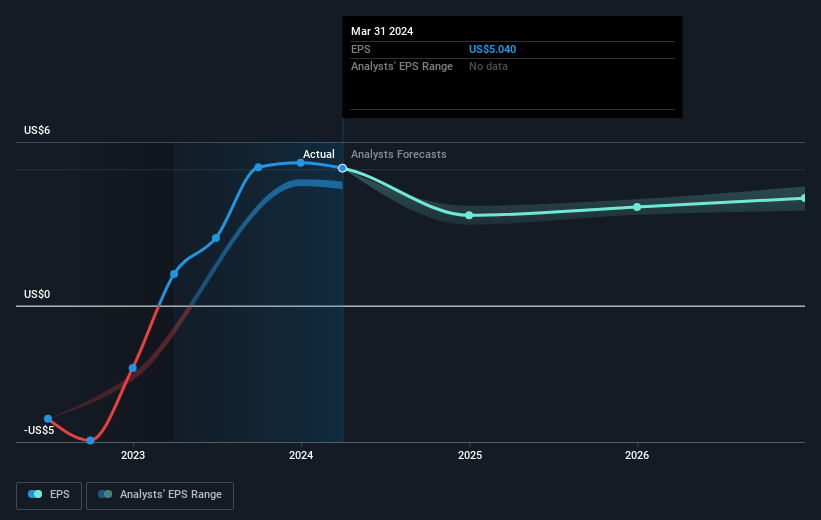- United States
- /
- General Merchandise and Department Stores
- /
- NasdaqGS:EBAY
eBay (NASDAQ:EBAY) shareholders have earned a 8.9% CAGR over the last five years

If you buy and hold a stock for many years, you'd hope to be making a profit. But more than that, you probably want to see it rise more than the market average. But eBay Inc. (NASDAQ:EBAY) has fallen short of that second goal, with a share price rise of 41% over five years, which is below the market return. Zooming in, the stock is up a respectable 19% in the last year.
Let's take a look at the underlying fundamentals over the longer term, and see if they've been consistent with shareholders returns.
View our latest analysis for eBay
While the efficient markets hypothesis continues to be taught by some, it has been proven that markets are over-reactive dynamic systems, and investors are not always rational. One imperfect but simple way to consider how the market perception of a company has shifted is to compare the change in the earnings per share (EPS) with the share price movement.
During five years of share price growth, eBay achieved compound earnings per share (EPS) growth of 14% per year. This EPS growth is higher than the 7% average annual increase in the share price. So it seems the market isn't so enthusiastic about the stock these days. The reasonably low P/E ratio of 10.29 also suggests market apprehension.
The image below shows how EPS has tracked over time (if you click on the image you can see greater detail).

We know that eBay has improved its bottom line lately, but is it going to grow revenue? Check if analysts think eBay will grow revenue in the future.
What About Dividends?
When looking at investment returns, it is important to consider the difference between total shareholder return (TSR) and share price return. Whereas the share price return only reflects the change in the share price, the TSR includes the value of dividends (assuming they were reinvested) and the benefit of any discounted capital raising or spin-off. Arguably, the TSR gives a more comprehensive picture of the return generated by a stock. As it happens, eBay's TSR for the last 5 years was 53%, which exceeds the share price return mentioned earlier. This is largely a result of its dividend payments!
A Different Perspective
eBay's TSR for the year was broadly in line with the market average, at 22%. That gain looks pretty satisfying, and it is even better than the five-year TSR of 9% per year. It is possible that management foresight will bring growth well into the future, even if the share price slows down. It's always interesting to track share price performance over the longer term. But to understand eBay better, we need to consider many other factors. Take risks, for example - eBay has 4 warning signs (and 1 which makes us a bit uncomfortable) we think you should know about.
We will like eBay better if we see some big insider buys. While we wait, check out this free list of undervalued stocks (mostly small caps) with considerable, recent, insider buying.
Please note, the market returns quoted in this article reflect the market weighted average returns of stocks that currently trade on American exchanges.
New: Manage All Your Stock Portfolios in One Place
We've created the ultimate portfolio companion for stock investors, and it's free.
• Connect an unlimited number of Portfolios and see your total in one currency
• Be alerted to new Warning Signs or Risks via email or mobile
• Track the Fair Value of your stocks
Have feedback on this article? Concerned about the content? Get in touch with us directly. Alternatively, email editorial-team (at) simplywallst.com.
This article by Simply Wall St is general in nature. We provide commentary based on historical data and analyst forecasts only using an unbiased methodology and our articles are not intended to be financial advice. It does not constitute a recommendation to buy or sell any stock, and does not take account of your objectives, or your financial situation. We aim to bring you long-term focused analysis driven by fundamental data. Note that our analysis may not factor in the latest price-sensitive company announcements or qualitative material. Simply Wall St has no position in any stocks mentioned.
About NasdaqGS:EBAY
eBay
Operates marketplace platforms that connect buyers and sellers in the United States, the United Kingdom, China, Germany, and internationally.
Undervalued with adequate balance sheet.

